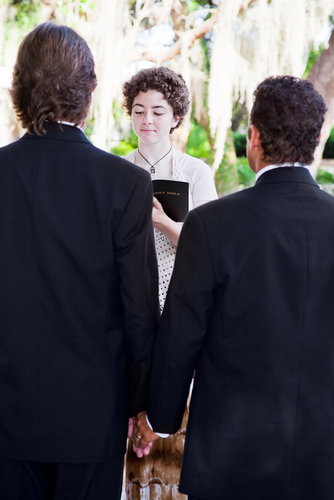That’s essentially what a new report from a left-of-center advocacy group is saying — conservatives changed their message on gay marriage in 2012, and lost four straight fights to stop it.
The Boston-based Political Research Associates examined the content and tone of the anti-gay marriage campaign and found some notable changes from previous years, when gay marriage foes stacked up a string of victories at the ballot box.
(It’s worth remembering that while Maine, Washington and Maryland approved gay marriage in 2012, and Minnesota rejected an attempt to ban it, voters in North Carolina passed a constitutional amendment to ban it last May.)
Why does this matter now? Because within a matter of weeks, the Supreme Court will hear two gay marriage cases and both sides are furiously filing their arguments with the court. How they frame the issue — and whether the justices buy it — will go a long way toward determining the outcome of this fight.
From the press release:
Same-sex marriage opponents downplayed “harm to kids” messaging this election cycle. In 2008, one of the Yes on 8 campaign’s most controversial — and successful — ads was the “Princes” ad, featuring a young daughter expressing excitement over learning in school that she can marry a “princess” someday, to her mother’s shock and dismay. In fall 2012, fewer than half featured “harm to kids” messaging, and often as only a side note to the main theme. In contrast, during California’s 2008 campaign and Maine’s Question 1 campaign in 2009, nearly every anti-LGBTQ advertisement warned voters that legalizing same-sex marriage would force public schools to discuss LGBTQ relationships and sexual behavior with children.
Instead, a popular theme was the “victims” argument — that same-sex marriage would effectively strip citizens of the right to act according to their religious beliefs. For example, an ad by Protect Marriage Maine featured a couple, Jim and Mary O’Reilly, claiming that they were barred from holding weddings at their inn as a consequence of marriage equality: “A lesbian couple sued us for not supporting their gay wedding because of our Christian beliefs. We had to pay thirty thousand dollars and can no longer host any weddings at our inn.” In fact, the wedding “ban” was voluntary on their part, and resulted from existing state nondiscrimination laws.
National Organization for Marriage’s (NOM) strategy to use same-sex marriage as a “wedge” issue between the African American and LGBTQ communities failed. As revealed in internal documents, NOM had sought to “find, equip, energize and connect African American spokespeople for marriage… [and] provoke the gay marriage base into responding by denouncing these spokesmen and women as bigots.” Yet come Election Day, Maryland exit polls showed African Americans – who comprise 30 percent of that state’s population — supported same-sex marriage by 46 percent. Moreover, according to national exit polls, African Americans supported their state legalizing same-sex marriage by 51 percent, compared to 47 percent of whites.
In 2012, pro-LGBTQ advocates largely abandoned the “rights-based” and “avoidance-based” themes, which had deliberately deemphasized LGBTQ couples, in favor of one that is strongly pro-LGBTQ. They stressed how LGBTQ couples and their families are affected due to their inability to marry — on an emotional level. Encouragingly, this more resonant, LGBTQ-inclusive messaging strategy was dominant in all four states facing ballot measures in 2012
The full report also points out that gay rights activists had a big assist from President Obama when he finished “evolving” on the issue and came out in support of gay marriage. Also helpful: the support of governors.
Political Research Associates describes itself as “a social justice think tank devoted to supporting progressive movements by providing investigative research and expert analysis on the U.S right-wing. We expose movements, institutions, and ideologies that undermine human and civil rights, focusing on issues including reproductive justice, LGBTQ rights, immigrant and racial justice, economic justice, and civil liberties.”





